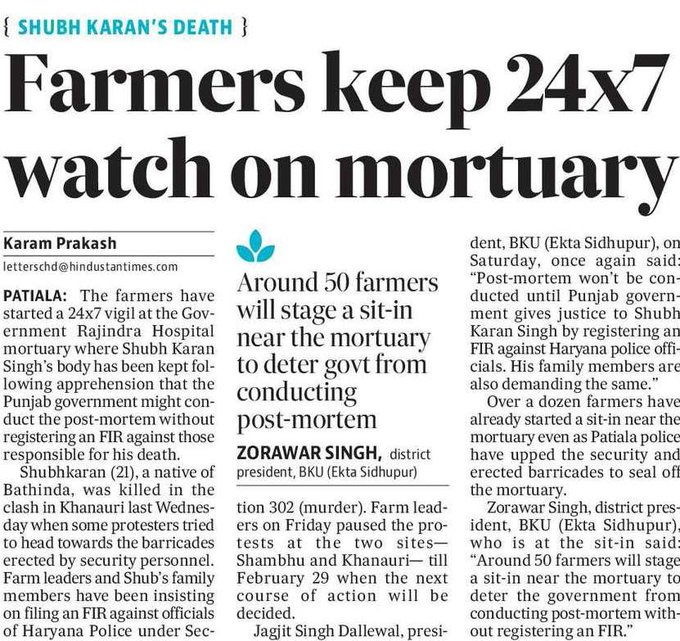Harvesting Dissonance: Punjab's Crisis of Collective Leadership
Echoes of Neglect: The Consequences of Leadership Failure in Punjab casts a shadow over the state, illustrated by the tragic death of Shubh Karan Singh.
A Shadow Over Punjab: The Tragedy of Shubh Karan Singh
In the fertile fields of Punjab, where the earth whispers tales of valour and toil, the tragic demise of Shubh Karan Singh, purportedly from a bullet discharged by Haryana Police, casts a profound shadow across the region. Amidst the clamour for justice and the echoes of unrest, the collective inaction over the inordinately delayed post-mortem examination speaks volumes. This oversight not only entangles the quest for truth in ambiguity but also plants seeds of discord among those seeking peace and resolution. As stakeholders from diverse sectors find themselves at a juncture, the legacy of Shubh Karan Singh's ultimate sacrifice emerges as a unifying call to action for a community in distress, desperately seeking closure and justice.
1. Critical Importance of a Post-Mortem Report
The significant delay in performing a post-mortem examination after the unfortunate passing of Shubh Karan Singh could turn out to be a critical oversight. This report, more than a mere medical assessment, serves as an essential piece of evidence that could elucidate the circumstances surrounding his death. Its absence not only hampers the legal path to justice but also adds layers of complexity to an already daunting task. The post-mortem report is pivotal, intended to accompany the FIR as a key document. The reluctance of farmer organizations to permit this examination, coupled with the local civil administration's apparent inefficacy, underlines a shortsightedness and a lack of efficiency that might jeopardize the quest for accountability and truth.
2. Risks of Delay in Post-Mortem
The inordinate delay in the post-mortem examination risks significant decomposition of the body, which could obscure the definitive cause of death. This concern is heightened by the potentially inadequate preservation conditions within the mortuary. Prompt action is crucial to secure precise and reliable findings, essential for preserving the investigation's integrity, which will be of paramount importance during any subsequent trial.
3. Forensic Evidence Deterioration
The delay in conducting a post-mortem and filing the FIR jeopardizes crucial forensic evidence, including ballistics and weapon identification. This not only hinders the investigation but also opens the door to potential tampering, compromising the pursuit of truth and justice.
4. Respect for the Deceased
Allowing Shubh Karan Singh's body to remain in the mortuary without conducting the last rites, in accordance with the Sikh maryada, is a disservice to his memory and sacrifice. It reflects poorly on the collective respect and reverence owed to him, further aggrieving his loved ones and supporters.
5. Family's Plight
Engulfed by grief and external pressures, the family of Shubh Karan Singh is caught in a distressing standstill. Their struggle to navigate the turmoil—comprising the acceptance of financial compensation from the Punjab Government and a job offer for the deceased's younger sister—intensifies their anguish. This dire situation calls for empathetic and resolute measures from all involved parties to alleviate the family's burden.
6. Conspiracy Theories
The ongoing delay and lack of transparency fuel speculation and conspiracy theories, undermining trust in the process and suggesting collusion among supposedly opposing entities. This erodes public confidence and detracts from the primary objectives of the protests and demands.
7. Detriment to the Farmers' Cause
This situation detracts from the core aim of securing a statutory basis for Minimum Support Price (MSP) for 23 crops. The focus shifts from constructive dialogue and advocacy to contention and suspicion, stalling progress towards meaningful agricultural reforms.
8. Political Exploitation
The exploitation of Shubh Karan Singh's tragic death for political leverage is unmistakably apparent, as various groups attempt to capitalize on this sorrow for their narrow interests. Such exploitative tactics detract from the much-needed unity and compassion towards the aggrieved family and the wider agricultural community, overshadowing sincere expressions of support and empathy. This scenario underscores the need for prioritizing human values and collective welfare over political maneuvering in times of communal grief.
9. Leadership Vacuum
The current crisis underscores a lack of effective leadership in Punjab, with no prominent figure stepping forward to navigate this impasse. This absence of statesmanship hampers efforts to resolve the situation amicably and constructively.
10. Reflection of Punjab's Stalemate
This incident serves as a microcosm of Punjab's broader socio-economic and political quagmires, embodying the stagnation and deadlock afflicting the state. It underscores the imperative for the populace to unite, organize, and proactively address their challenges indigenously. Absent collective action and self-help, no saviour will miraculously appear to alleviate the state's predicaments. This narrative spotlights the critical need for community-driven efforts to navigate through the complexities and propel Punjab towards progress and resolution.
Recommendation for CBI Investigation
Given the intricacies and potential for bias, recommending a Central Bureau of Investigation (CBI) probe into the death of Shubh Karan Singh is prudent. Advocating for a CBI investigation is crucial, as any inquiry conducted by the Punjab Police into actions of Haryana police personnel could be perceived as prejudiced. This approach would ensure neutrality, enhancing the legitimacy of the investigative efforts and possibly leading to a resolution that respects the truth and commemorates Singh's legacy.
Call for Restraint and Peaceful Negotiation
All stakeholders are urged to exercise restraint and engage in peaceful dialogue. Focusing on the foundational demands, particularly securing MSP on a statutory basis, should be prioritized without getting sidetracked by less tractable issues like WTO agreements.
Conclusion: "Cry, the Beloved Country"
In this moment of collective mourning and introspection, Alan Paton's poignant phrase from "Cry, the Beloved Country" resonates deeply. It serves as a somber reminder of the anguish and the potential for reconciliation and healing in the face of profound loss and injustice. The journey towards justice for Shubh Karan Singh— including a funeral and cremation with full state honours—, and by extension, the betterment of Punjab's agrarian community, requires unity, compassion, and determined advocacy.








Can’t agree more with the following paragraph.
“It underscores the imperative for the populace to unite, organize, and proactively address their challenges indigenously. Absent collective action and self-help, no saviour will miraculously appear to alleviate the state's predicaments. This narrative spotlights the critical need for community-driven efforts to navigate through the complexities and propel Punjab towards progress and resolution.”
This government exhibits fascist tendencies, showing varying degrees of animosity towards different communities at different times. The levels of coercion and oppression fluctuate for each community, and it's crucial to understand that no community is immune. If a community currently feels unaffected, they should recognize that they might face challenges in the future. A majoritarian government is incapable of dispensing justice. The only viable solution is to ensure the permanent removal of "majoritarianism" from the government, achieved either through a change of Govt. or by compelling the present government to abandon this majoritarian ideology.